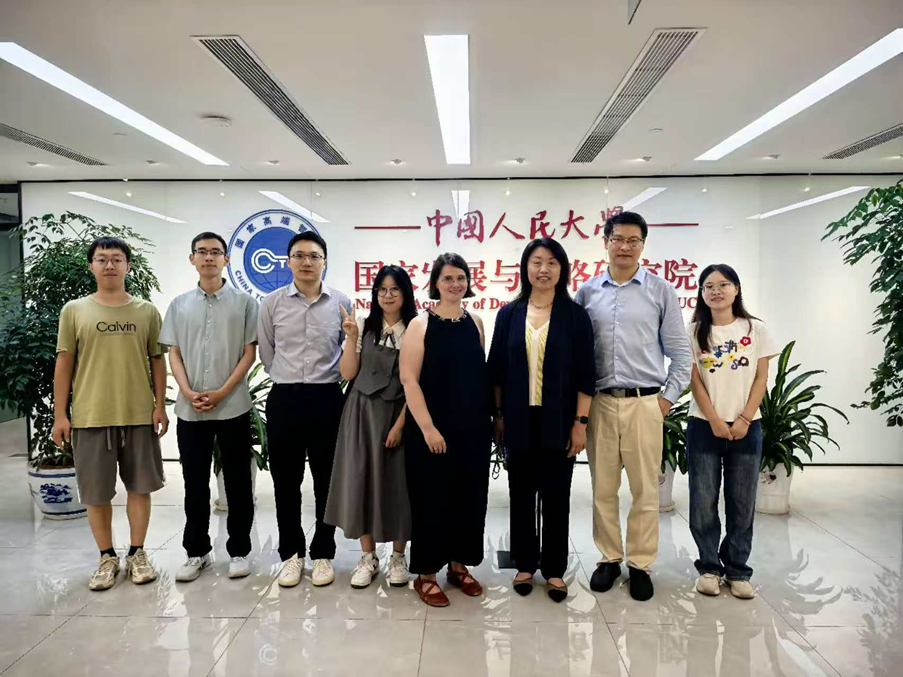Dr Sofie Waltl visited several Chinese universities between 24th July and 5th August 2025 to develop existing partnerships, establish new research cooperations and re-connect with past Cambridge Land Economy staff and students to foster our global network. As part of the visit, Dr Waltl met with researchers at Renmin University of China, Nanjing Agriculture University, Hangzhou City University, Inner Mongolia Agriculture University, Inner Mongolia University, and Inner Mongolia University of Finance and Economics.

Dr Waltl visiting Renmin University
During the trip Dr Waltl also presented ongoing current research projects to show the breadth of research undertaken at the Department of Land Economy. At a seminar at Renmin University and a keynote lecture at the International Symposium on Land and Real Estate Policy Research hosted at Nanjing Agriculture University, she presented findings from a recent study empirically assessing the impact of omitting a profound cost estimate arising to owner-occupiers in the Euro Area’s main inflation index (the Harmonized Index of Consumer Prices, HICP). Similarly in the EU and China, such a cost component is missing in their respective inflation measures.
This omission may imply too weak responses in the form of active monetary policy adjustments during times of excessively booming house markets, which could further fuel market activity. Incorporating this cost component in the Euro Area measure can be shown to act as a better early warning measure during times of inflationary pressure fuelled by real estate booms. Vice versa, when house prices collapse, the counterfactually measured inflation would react earlier when incorporating owner-occupiers’ housing costs. By that, classical inflation-targeting central banks may almost automatically better help to prevent housing markets from overheating than they currently do. Particularly during the post-pandemic period, measured inflation would have never reached the zero-lower bound as households were excessively investing in real estate pushing up prices. Parallels with the recent experience of the Chinese real estate bubble and similar shortcomings in Chinese inflation statistics are evident.

Dr Waltl presenting her paper at Nanjing Agriculture University
Further, at Hangzhou City University, Dr Waltl presented a study measuring the adverse effect of excessive heat on students’ exam performance - a topic becoming increasingly more relevant globally given increasing temperatures. In this case study on India, records of students’ performance in a compulsory, country-wide exam concluding the first cycle of primary education are linked to longitudinal information on meteorological conditions and land use information for fine locational grid cells measured by satellites. Excessive heat has a strong negative effect on passing the exam and also decreases the probability of receiving a distinction. A counterfactual simulation based on Representative Concentration Pathways (RCP) climate change scenarios predicts that a constant increase in temperature even under the most optimistic scenario would ceteris paribus mean a drop in the number of students passing the exam by 3% and a drop in distinctions by 18%, hinting towards a sizeable potential loss in human capital. Heat is shown to be most harmful if paired with high humidity and air pollution. Further, the study finds that the negative impact on exam pass rates intensifies with higher temperature ranges, with the effect being largest on days with maximum temperatures exceeding 40°C. Students in less wealthy areas and, in particular, the urban-poor are found to be most vulnerable.

Dr Waltl visiting Hangzhou City University
At Inner Mongolia University, Dr Waltl presented an experimental labour market study assessing behavioural responses to within-firm wage inequality. Is perceived fairness of an adopted wage-setting procedure decisive for whether receiving comparably lower wages has a demotivating effect on workers expressed in the form of decreased exerted effort? The study develops a new testing strategy to answer this question, overcoming several shortcomings in research strategies adopted in previous studies. Indeed, inequality has demotivating effects if it is the result of an as unfair perceived wage setting mechanism, yet much less so when a fair procedure had been adopted. The negative effect of perceived unjust wage inequality is driven by younger and female study participants. Both internal and external validity tests support the applicability of results to real-world employment settings, yet follow-up field experiments would be needed to prove these nuanced differences.



